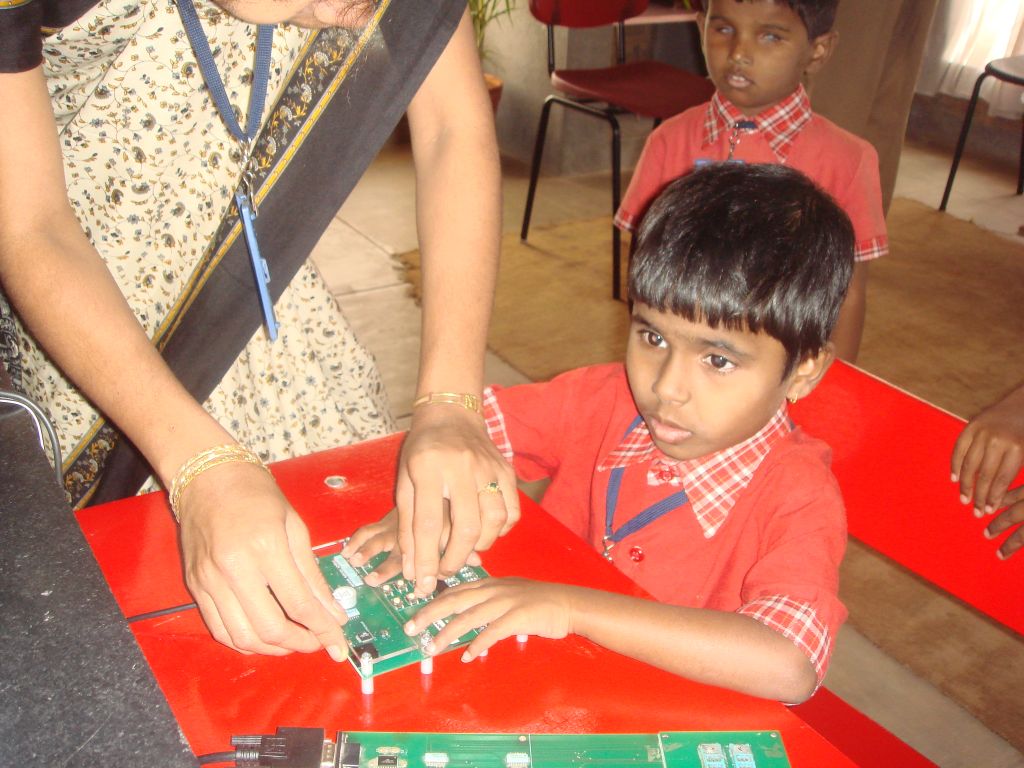Carnegie Mellon Releases Specifications, Software For Low-Cost Automated Braille Writing Tutor
Byron SpiceMonday, October 4, 2010Print this page.

Open Source Release Makes Device Available for Developing Nations
PITTSBURGH-Carnegie Mellon University's TechBridgeWorld program has publicly released the hardware specifications and software for its Braille Writing Tutor, an innovative device that helps visually impaired students learn the tricky task of writing Braille letters with a traditional slate and stylus.
The specifications and software for the second generation of the device have been released under an MIT open source license and are available for download at http://sourceforge.net/projects/tbwbrailletutor/.
"We've been approached a number of times by people interested in commercializing the device," said M. Freddie Dias, a research engineer at Carnegie Mellon's Robotics Institute and a technical adviser to TechBridgeWorld. "But we didn't want it to become a product that would be priced beyond the limited means of the people we mean to help. By releasing it as open source, we hope to leave the option open for companies interested in producing it, while also keeping it available for production by non-governmental organizations and other institutions."
Braille typewriters and other specialized keyboards are common in much of the developed world, but mastering the slate and stylus remains a challenge for millions of visually impaired people in developing nations. For these people, achieving literacy requires the ability to both read and write in Braille. Creating the raised dimples that make up Braille letters with the slate and stylus is not intuitive, requiring students to turn the paper over and write the letters backwards - and then turn the paper over again to check their work.
Since 2005, Carnegie Mellon students in the TechBridgeWorld program have developed the Braille Writing Tutor and researchers have successfully field-tested it, first at the Mathru School for the Blind in Bangalore, India, in 2006, and subsequently in Bangladesh, Tanzania and Zambia. The device can sense the impressions being made as students write in Braille and provide immediate, audible feedback as to what letter or word has been written. Between 40 and 50 of the devices have been developed and tested as part of those research programs.
TechBridgeWorld is a program within Carnegie Mellon's Robotics Institute that challenges students to use innovative technologies to improve the lives of people in technologically underserved areas of the world.
"The Braille Writing Tutor is certainly one of our most successful projects to date," said M. Bernardine Dias, assistant research professor of robotics and founder and director of TechBridgeWorld. "Our students have worked with educators in several countries to develop and test this technology. Though we haven't perfected the automated tutor by any means, the need for it exceeds our ability to sponsor research projects. That's why we've decided to make all of the information necessary to build these devices freely available."
Building the automated tutors is more than a do-it-yourself project, Freddie noted, but the downloadable hardware specifications can be used by electronic fabrication firms to make the printed circuit board at the heart of the tutoring device. He said Carnegie Mellon has ordered the circuit boards in lots of 10 at a cost of about $150 per board; fabricating the boards in large quantities could bring per-unit costs down dramatically.
TechBridgeWorld anticipates and welcomes the possibility that some people may use the second-generation design specs, as well as the downloadable software and firmware, to further develop the tutor or adapt it to new applications, such as a gaming device. Meanwhile, TechBridgeWorld continues its own development of a third-generation device, which unlike the current version would not require the use of an external computer.
The project was made possible through the efforts of many sponsors, partners and Carnegie Mellon students, faculty and staff.

Byron Spice | 412-268-9068 | bspice@cs.cmu.edu
